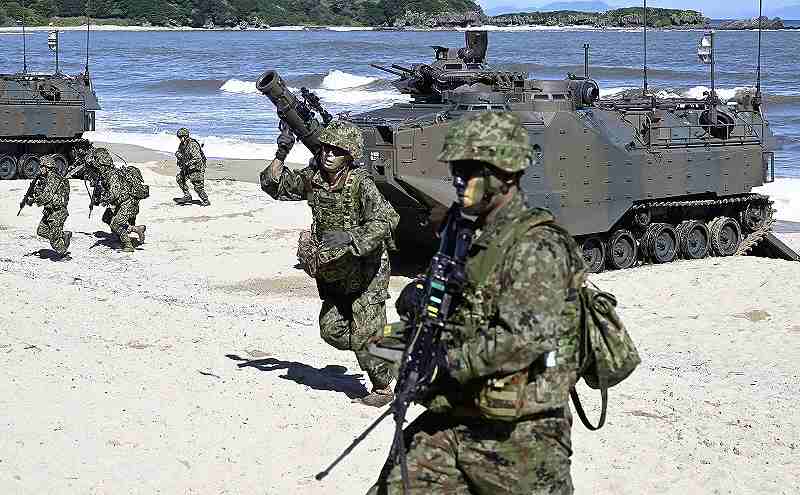Defense Perspective: Forward Reconnaissance / Self-Defense Forces to be transformed into ‘fighting force’

Members of the Ground Self-Defense Force’s Amphibious Rapid Deployment Brigade conduct landing training during a joint Japan-U.S. military drill at Manda Beach in Tokunoshima, Kagoshima Prefecture, on Nov. 18.
2:00 JST, December 24, 2022
Japan has come to a turning point with the approval of three defense and security-related documents, including the new National Security Strategy. The following is the first installment in a series of articles examining the future direction of Japan’s security policy.
***
“The target date is … in fiscal 2027.”
The year 2027 appears everywhere in the three defense and security-related documents — the National Security Strategy, the National Defense Strategy and the Defense Buildup Program — approved by the Cabinet on Dec. 16, which emphasize strengthening defense capabilities over the following five years.
But the next half decade is more than just a unit of time for planning.
In 2027, the administration led by Chinese President Xi Jinping will try to culminate its work in Xi’s third term in office and will also mark the 100th anniversary of the founding of the People’s Liberation Army of China. Security experts widely believe that China may launch efforts toward a forced reunification with Taiwan in 2027.
The National Security Strategy warns that “the possibility of a situation similar to the aggression against Ukraine occurring in East Asia cannot be ruled out.”
On Dec. 5, Prime Minister Fumio Kishida called Defense Minister Yasukazu Hamada and Finance Minister Shunichi Suzuki to the Prime Minister’s Office and informed them of his decision to drastically increase the country’s defense spending to approximately ¥43 trillion over the next five years.
“The security environment has been changing dramatically. I want you to see to it that the necessary equipment and systems are promptly put in place,” Kishida stressed.
The Self-Defense Forces have long been compelled to be less than a “fighting force” due to constitutional restraints and budgetary restrictions, with the defense budget kept below the equivalent of 1% of Japan’s gross domestic product. In fiscal 2027, however, defense and related expenditures are set to be increased to the equivalent of 2% of the GDP, so the SDF can be transformed into “an organization capable of fighting,” thereby making potential adversaries hesitate to attack.
The biggest pillar of the policy shift is the possession of counterstrike capabilities, which the governments in post-war years had consistently shelved in their policy decisions. Deterrence can only function if adversaries believe they might be counterattacked if they strike another country.
To ensure Japan has the means to hit back, Kishida has also decided to introduce U.S.-made Tomahawk cruise missiles.
At the Japan-U.S. summit on Nov. 13, Kishida won a promise from U.S. President Joe Biden that Biden would prioritize efforts to ensure that Japan can introduce the cruise missiles.
The budget related to “sustainability and resilience,” which would enhance the ability to sustain military operations, will be raised to about ¥15 trillion over the next five years, or 2.5 times the current level. The increased outlays will help eliminate the grave flaw of a shortage of ammunition and missiles, thus increasing the operational availability of equipment, which is estimated now to be only just over 50% due to shortages of parts and other problems.
The Defense Ministry and the SDF, which for the first time will obtain a budget large enough to deal with external threats head-on, will assume an unprecedented degree of responsibility. Since their budgets have sometimes been criticized for sloppy implementation in the past, a thorough verification concerning their cost-effectiveness and their achievement of objectives, including those of development plans, will be essential.
“Our true value will be tested from now on,” Hamada said to senior officials at his ministry on Dec. 16.
Defense capabilities are also a way to enhance a country’s diplomatic power. It is a reality of international politics that “an autocratic state that relies on power will not even engage in dialogue with a powerless state,” as a senior Foreign Ministry official put it.
Kishida will be required to tenaciously steer the country’s diplomacy, which will be backed by stronger defense capabilities.
Japan misjudged the international situation in the past and plunged into a reckless war. After the war, Japan has enjoyed peace and prosperity, but it also developed the optimistic view that peace could be maintained as long as Japan remained peaceful.
Postwar Prime Minister Shigeru Yoshida, who prioritized economic recovery and followed a policy of “light armament” in which Japan relied on the U.S. military for security, wrote in his 1967 book that “the stage in which Japan relies on other countries’ power [for defense] is about to end.”
More than half a century later, Japan will finally change its defense policy based on “a commonsense belief that we should protect our own country by ourselves,” as expressed in a report compiled by an expert panel tasked to consider defense capabilities as a national power.
National defense cannot be achieved by the SDF alone. Public understanding and political leadership are essential.
Top Articles in Politics
-

Japan PM Takaichi’s Cabinet Resigns en Masse
-

Sanae Takaichi Elected Prime Minister of Japan; Keeps All Cabinet Appointees from Previous Term
-

Japan’s Govt to Submit Road Map for Growth Strategy in March, PM Takaichi to Announce in Upcoming Policy Speech
-

LDP Wins Historic Landslide Victory
-

LDP Wins Landslide Victory, Secures Single-party Majority; Ruling Coalition with JIP Poised to Secure Over 300 seats (UPDATE 1)
JN ACCESS RANKING
-

Producer Behind Pop Group XG Arrested for Cocaine Possession
-

Japan PM Takaichi’s Cabinet Resigns en Masse
-

Man Infected with Measles Reportedly Dined at Restaurant in Tokyo Station
-

Israeli Ambassador to Japan Speaks about Japan’s Role in the Reconstruction of Gaza
-

Videos Plagiarized, Reposted with False Subtitles Claiming ‘Ryukyu Belongs to China’; Anti-China False Information Also Posted in Japan
























